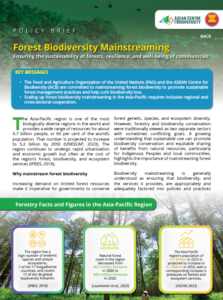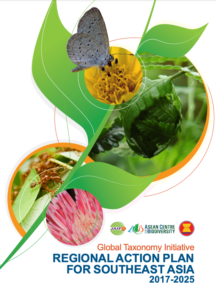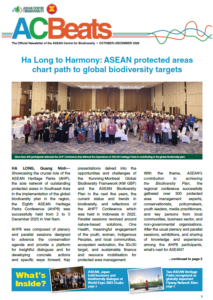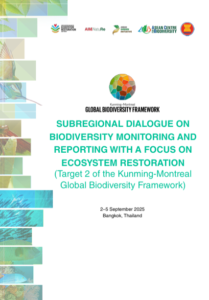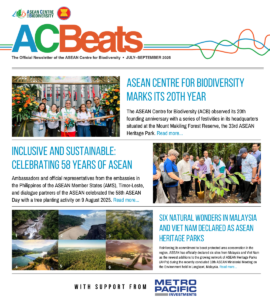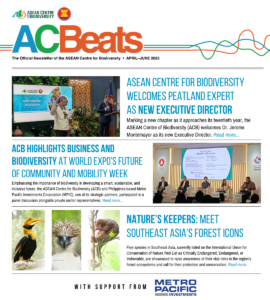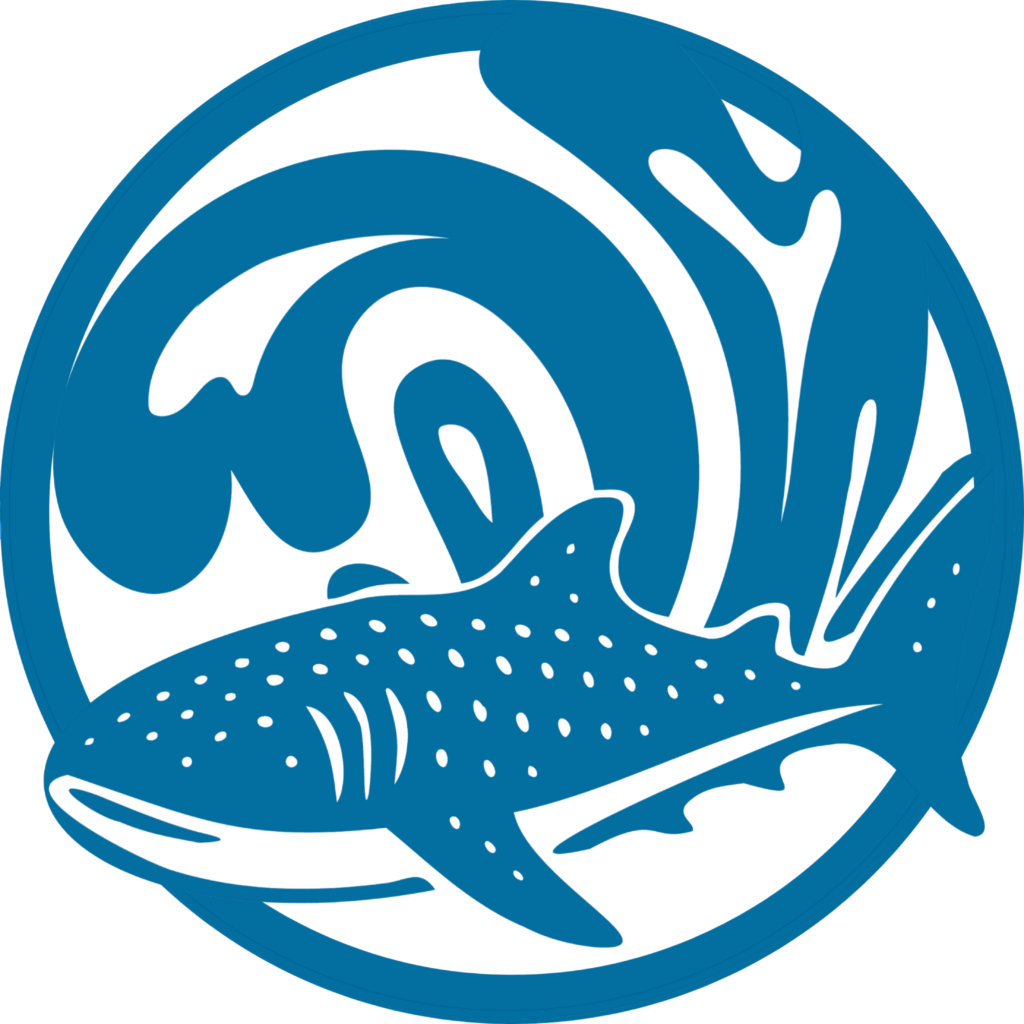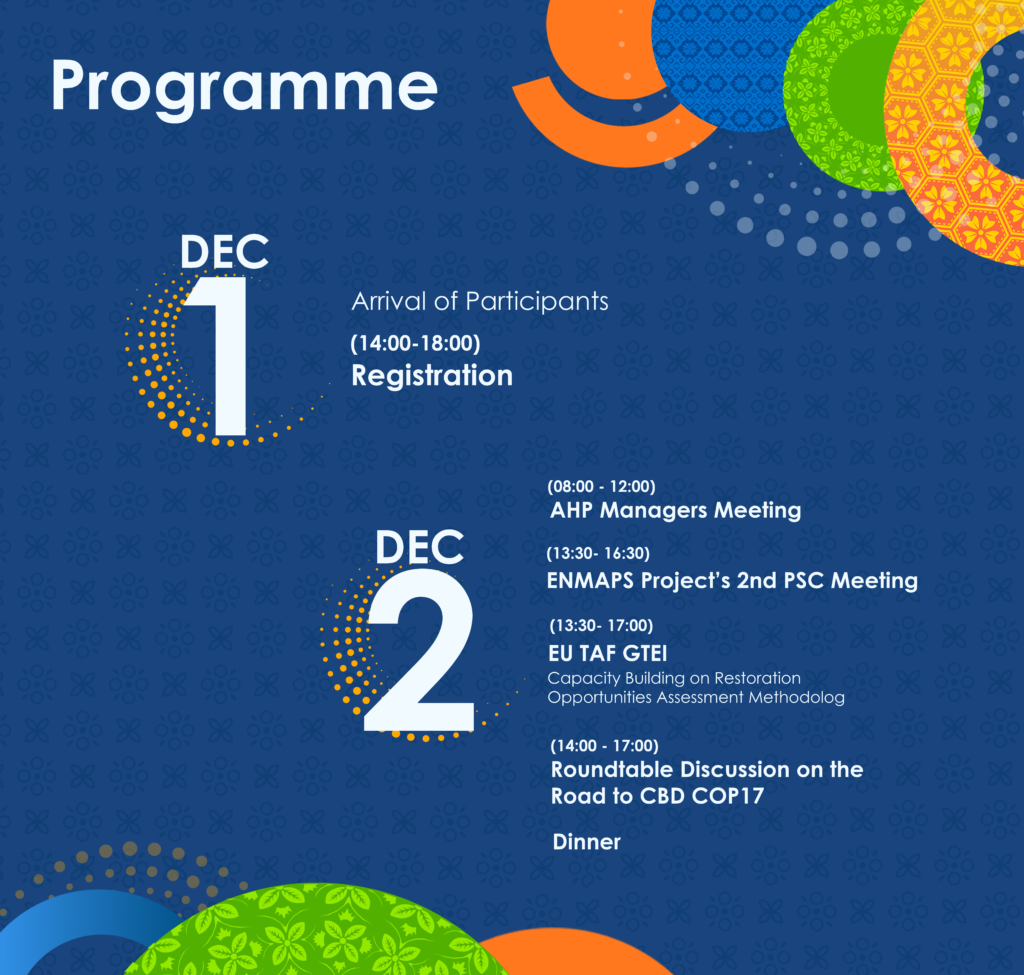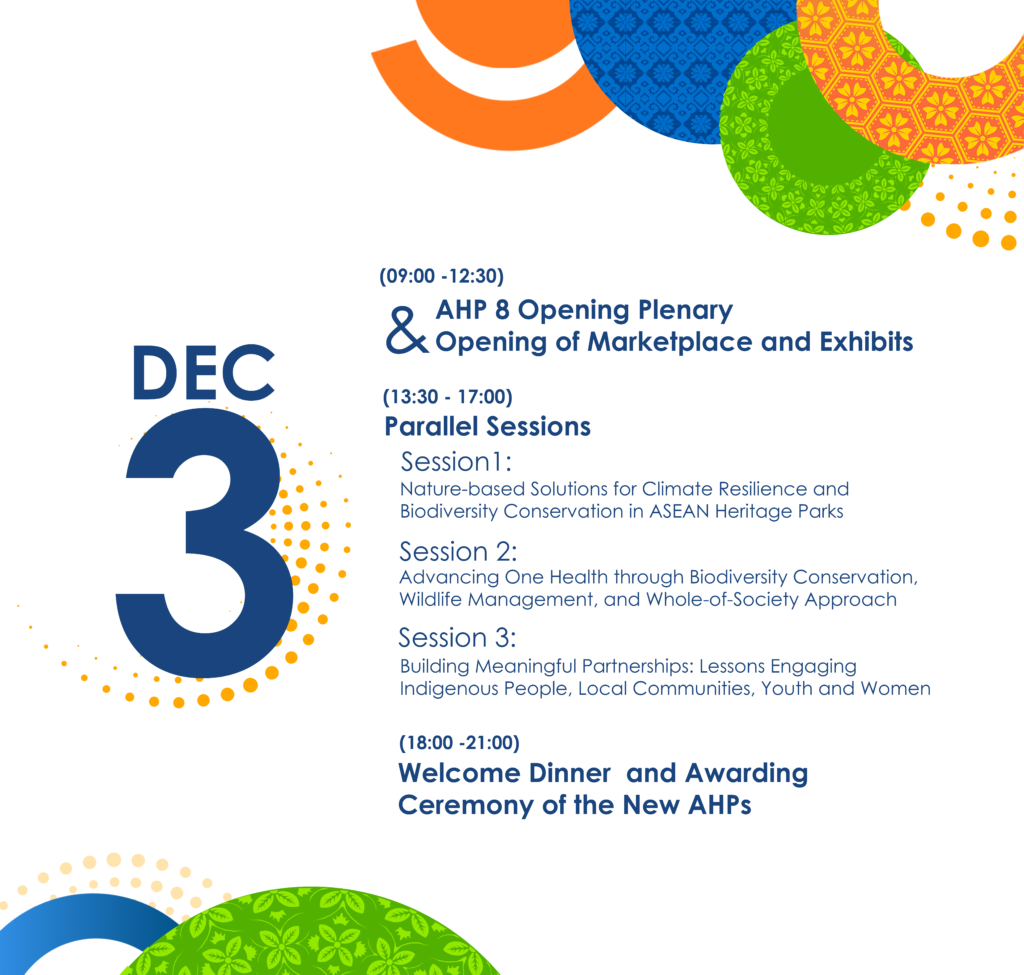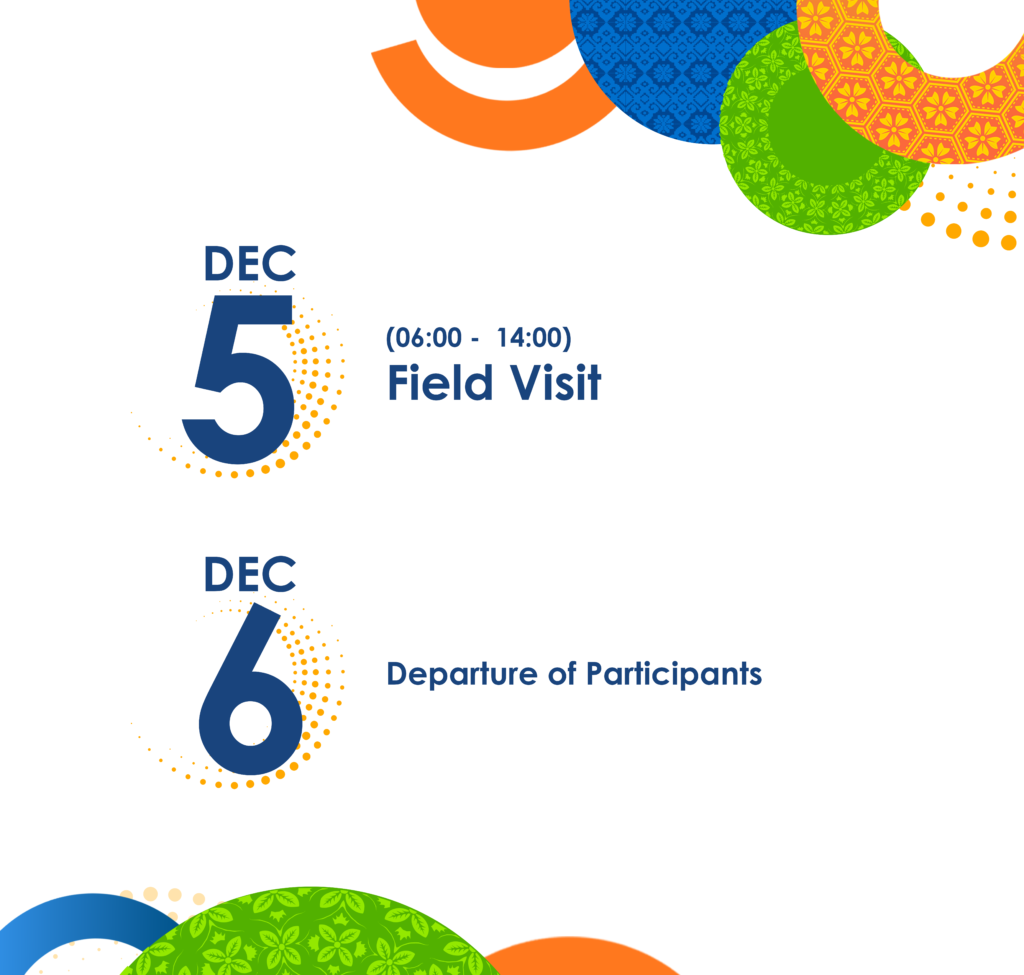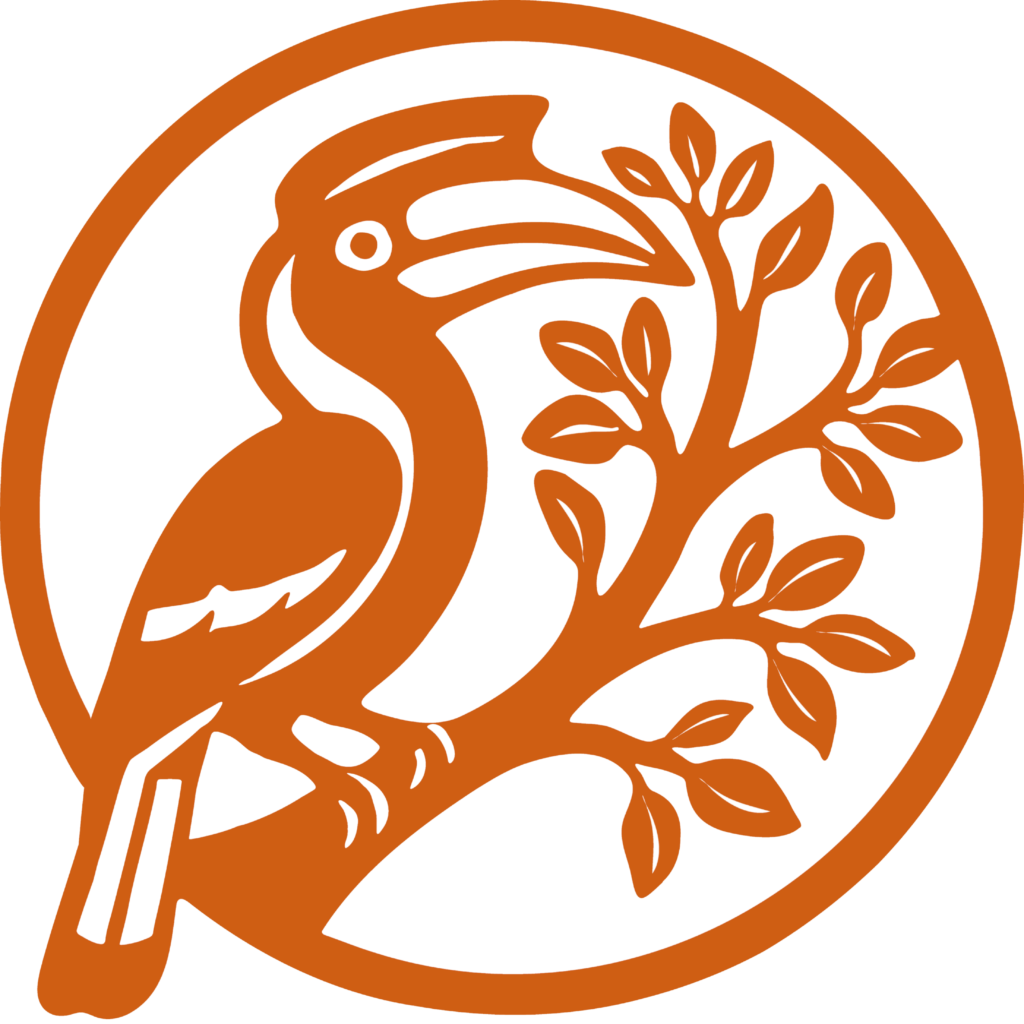Dr. Jerome L. Montemayor
Executive Director, ASEAN Centre for Biodiversity
In 1967, the governments of Indonesia, Malaysia, the Philippines, Singapore, and Thailand established the Association of Southeast Asian Nations (ASEAN) with the signing of what is now called the “Bangkok Declaration”. Indeed, things were very different back then—very different from the opportunities and difficulties we now face. Nonetheless, the same commitment to regional cooperation continues to bind what has now grown to ten ASEAN Member States. This same dedication paved the way for the establishment of the ASEAN Centre for Biodiversity (ACB) almost two decades ago.
As we commemorate the 58th ASEAN Day, the ACB joins the regional community in celebrating what we have achieved together and looking towards an inclusive and sustainable ASEAN future.”
Earlier this year, at the World Expo 2025 in Osaka, the ACB took part in a panel discussion organised by the ASEAN-Japan Centre. During the event, various stakeholders, especially those in the business sector, engaged in imagining the future we want to see. We emphasised how an inclusive and sustainable future is built on balancing human needs with planetary health. This starts with recognising how much we rely on the many ecosystem services we benefit from, directly or indirectly. The ASEAN Annual Report 2024 reports that the regional gross domestic product is projected at 4.5% this year, contributing to becoming the world’s fourth-largest economy by 2030. ASEAN is also the third-largest global trading bloc, with total trade amounting to USD 3.5 trillion. This fast-growing economy is built upon the state of biodiversity in the region, a form of capital that economic actors must consider.
To better understand this, we can translate the importance of biodiversity into economic terms. A 2012 study on the ecosystem service values for mangroves in Southeast Asia estimates that the forgone annual benefits from mangroves alone in a “business-as-usual” scenario by 2050 are valued at USD 2.2 billion. It assessed the reduction in the value of two ecosystem services: coastal protection and habitat/nursery support for fisheries. On the other hand, for coral reefs, the annual loss of value by 2050 is expected to be USD 5.6 billion. These are about mangroves and coral reefs alone.
Road to ASEAN 2045: Our Shared Future
Last year, the 16th meeting of the Conference of the Parties (COP 16) to the Convention on Biological Diversity (CBD) in Cali, Colombia, was dubbed the “People’s COP”. It highlighted the call for a whole-of-society approach to implementing the Kunming-Montreal Global Biodiversity Framework (KM GBF). Beyond merely promoting inclusivity, the Convention advocates for fairness and equity, emphasising the importance of full and meaningful participation of all relevant actors, notably biodiversity stewards, Indigenous Peoples and local communities. This emphasis on inclusive governance ensures that conservation efforts are equitable and culturally sensitive, allowing diverse perspectives and innovations to inform biodiversity policies.
The ASEAN Biodiversity Plan embodies these core principles, acting as a regional strategy and action plan that aligns the 23 targets of the KM GBF with ASEAN’s vision. The region seeks to boost the involvement of non-state actors in biodiversity discussions and to integrate considerations across all biodiversity initiatives. These strategic measures are also reflected in the ASEAN Community Vision 2045, a strategic roadmap guiding the region towards a shared future that is inclusive, innovative, dynamic, and people-centred.
As one of the technical and scientific cooperation support centres chosen by the CBD, this whole-of-society approach is deeply embedded in several programmes of the ACB. The Small Grants Programme by the ASEAN Centre for Biodiversity I and II (SGP I and II) has successfully fostered strong multi-stakeholder collaboration among local communities, government agencies, and civil society organisations in Indonesia, Myanmar, and currently, Viet Nam. Supported by Germany through the KfW Development Bank, the SGP has supported 169 projects on biodiversity conservation and sustainable livelihoods; trained more than 3,000 community partners in forest management and community- and nature-based livelihoods; and involved three national governments, 10 ASEAN Heritage Parks managements, and several local government units in the programme’s implementation.
The ACB and UNDP likewise increase the involvement of non-state actors in coastal and marine biodiversity conservation efforts through the Effectively Managing Networks of Marine Protected Areas in Large Marine Ecosystems in the ASEAN Region (ASEAN ENMAPS) project. By prioritising sustainability, equitable access, and biodiversity conservation, the project aims to develop thriving ecosystems that benefit society while conserving natural resources for future generations. Guided by the UNDP Social and Environmental Standards and other social safeguards, ASEAN ENMAPS uses a participatory decision-making approach in working with women, youth, Indigenous Peoples, and local communities. Furthermore, the project’s Grievance Redress Mechanism offers a clear and accessible process for raising and addressing concerns, ensuring no one is left behind. Through the Empowered Voices of ASEAN communication campaign, the project amplifies stakeholder perspectives, fostering inclusive dialogue, accountability, and shared ownership of marine and coastal conservation efforts across the region.
Another initiative anchored to regional multi-stakeholder engagement is the Improving Biodiversity Conservation of Wetlands and Migratory Waterbirds in the ASEAN Region project. Supported by Japan through the Japan-ASEAN Integration Fund, it aims to build and sustain the capacity of the ASEAN Flyway Network (AFN) in effectively monitoring and managing wetlands and migratory waterbirds across the ASEAN region. The AFN brings together a diverse group of national focal points, flyway site managers, wetlands and bird experts, and other key stakeholders from all the AMS, working collectively to conserve migratory waterbirds and the critical wetland habitats they depend on along the East Asian-Australasian Flyway. Complementing these efforts, the Government of New Zealand, through the Ministry of Foreign Affairs and Trade, supports enhancing communication, education, and public awareness initiatives on the value of these migratory waterbirds and their habitats. This contribution strengthens community engagement and stakeholder participation, which are critical components in ensuring the inclusive and effective management of wetlands and the sustainability of conservation actions throughout the region.
In addition, the Enhancing Conservation and Restoration of Wetlands and Peatlands in ASEAN as Effective Sinks and Reservoirs of Greenhouse Gases (EnCORE Wetlands), an ACB project in partnership with the Global Environment Centre (GEC) that is supported by funding from the ASEAN-UK Green Transition Fund (ASEAN-UK-GTF), also embeds stakeholder participation and integrates the Social and Environmental Safeguards and Gender Plan. This ensures the protection of the environment while upholding the rights and well-being of the involved communities. Before its launch on 26 July, the ACB conducted a consultation series with the two project sites in Agusan Marsh Wildlife Sanctuary in the Philippines and Maludam National Park in Sarawak, Malaysia. One of its key strategies, promoting sustainable peatland management, empowers the communities through a nature-positive economy. Through this project, the ACB will work with the project’s pilot sites to develop access and benefit-sharing agreements for livelihood projects using biodiversity-based products. In addition, a market study including value chain analysis for climate-smart biodiversity-based activities, products, and services will also be conducted to strengthen these initiatives.
Recognising how much economies depend on biological resources, there is a need to capture the interest of businesses and the private sector and convince these influential sectors that biodiversity conservation is not only necessary but, more importantly, a viable investment. In 2023, the ACB and the ASEAN Business Advisory Council forged a partnership called the ASEAN Business and Biodiversity Initiative (ABBI) to mainstream biodiversity in business operations. The ABBI provides an informal regional platform for sharing knowledge and information to boost business and biodiversity collaboration in the ASEAN region.
Lastly, in the recently concluded meeting of the ASEAN One Health Network in Malaysia, representatives from ASEAN Member States reiterated the necessity of ensuring the environment is an integral part of the One Health Initiative. Building on this, the ACB will work with other ASEAN centres to strengthen capacities and sustain multisectoral coordination to better prevent, detect, prepare for, and respond to emerging infectious diseases.
Celebrating inclusivity and sustainability
As part of the twin 58th ASEAN Day celebrations, led by the ASEAN Secretariat, the ACB will participate in various activities and exhibits in Jakarta, Indonesia, and in Osaka, Japan. The ACB is also part of the ASEAN Month Celebration organised by the Department of Environment and Natural Resources of the Philippines (DENR). It will also participate in the 32nd Annual Philippine Biodiversity Symposium in Iloilo City, where it will conduct the Knowledge Management for Biodiversity Workshop for the Philippines in collaboration with the Biodiversity Management Bureau of the DENR. Two tree-growing activities are also slated for August to symbolise the steadfast commitment of each member state to conserving ASEAN biodiversity as one strong community.
Biodiversity epitomises inclusivity. All species—from the smallest microorganism to the largest mammal—have unique roles in creating a healthy and thriving ecosystem. ASEAN Day is a constant reminder of the need to embrace diversity and unity in pursuit of a more resilient and better planet for all.
Happy ASEAN Day! -END


